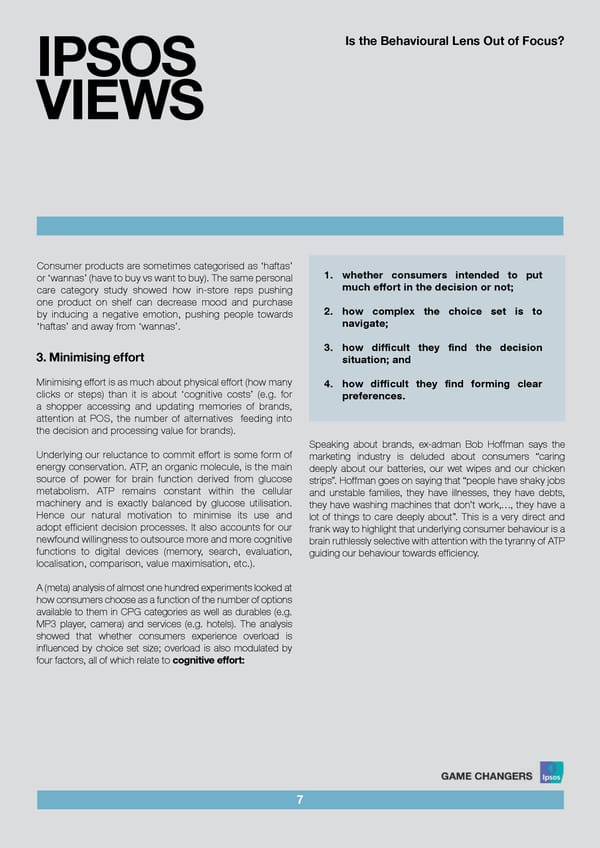IPSOS Is the Behavioural Lens Out of Focus? VIEWS Consumer products are sometimes categorised as ‘haftas’ or ‘wannas’ (have to buy vs want to buy). The same personal 1. whether consumers intended to put care category study showed how in-store reps pushing much effort in the decision or not; one product on shelf can decrease mood and purchase by inducing a negative emotion, pushing people towards 2. how complex the choice set is to ‘haftas’ and away from ‘wannas’. navigate; 3. Minimising effort 3. how difficult they find the decision situation; and Minimising effort is as much about physical effort (how many 4. how difficult they find forming clear clicks or steps) than it is about ‘cognitive costs’ (e.g. for preferences. a shopper accessing and updating memories of brands, attention at POS, the number of alternatives feeding into the decision and processing value for brands). Speaking about brands, ex-adman Bob Hoffman says the Underlying our reluctance to commit effort is some form of marketing industry is deluded about consumers “caring energy conservation. ATP, an organic molecule, is the main deeply about our batteries, our wet wipes and our chicken source of power for brain function derived from glucose strips”. Hoffman goes on saying that “people have shaky jobs metabolism. ATP remains constant within the cellular and unstable families, they have illnesses, they have debts, machinery and is exactly balanced by glucose utilisation. they have washing machines that don’t work,…, they have a Hence our natural motivation to minimise its use and lot of things to care deeply about”. This is a very direct and adopt efficient decision processes. It also accounts for our frank way to highlight that underlying consumer behaviour is a newfound willingness to outsource more and more cognitive brain ruthlessly selective with attention with the tyranny of ATP functions to digital devices (memory, search, evaluation, guiding our behaviour towards efficiency. localisation, comparison, value maximisation, etc.). A (meta) analysis of almost one hundred experiments looked at how consumers choose as a function of the number of options available to them in CPG categories as well as durables (e.g. MP3 player, camera) and services (e.g. hotels). The analysis showed that whether consumers experience overload is influenced by choice set size; overload is also modulated by four factors, all of which relate to cognitive effort: 7
 Is the Behavioural Lens Out of Focus? Page 8 Page 10
Is the Behavioural Lens Out of Focus? Page 8 Page 10